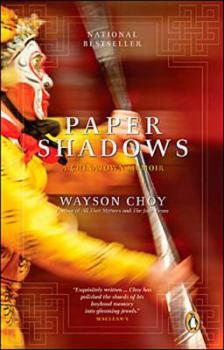Paper Shadows
Select Format
Select Condition 
Book Overview
Shortlisted for the Governor General's Award A startlingly vivid memoir of a Chinatown childhood by the author of the award-winning novel The Jade Peony. Three weeks before his 57th birthday, novelist... This description may be from another edition of this product.
Format:Paperback
Language:English
ISBN:0143054368
ISBN13:9780143054368
Release Date:September 2000
Publisher:Penguin Books Canada
Length:352 Pages
Customer Reviews
2 ratings
Growing up in Vancouver's Chinatown in the 1940s
Published by Thriftbooks.com User , 19 years ago
Now a respected professor and novelist in Canada, Wayson Choy was 57 years old in 1999 when he learned that he had been adopted. This memoir is a result of that discovery and, even though some family secrets do get discovered, by the end of this 342 page-book, he and the reader understand that much of his suppressed family history will never be completely uncovered. I did enjoy the story itself, however, which deals almost exclusively with his childhood years. Born in Vancouver in 1939, his memory of those early ears and his simple descriptions put me right into the young boy's mind.. He's the only child of hard-working Chinese immigrants in the land they refer to as Golden Mountain. Chinatown in those years was a world unto itself, and the young boy was loved and cherished by his parents as well as a large assortment of "uncles" whose own families were still back in China. Through his eyes we see the elaborate Chinese operas, which were transported to Canadian soil, and which his mother always enjoyed. We see his early encounters with English books and his strong will to learn to read. We see him go to a Canadian nursery school and learn about the Christian religion. We understand his Chinese roots and the many ghosts and spirits that are part of his Chinese culture. We meet his dog and have to laugh at the way this loving pet took over his life. Chinatown becomes real for the reader and so does the boy's obsession with cowboys and refusal to go to a traditional Chinese school. Most of the book was devoted to this very detailed portrait. Basically, this childhood was filled with love and little trauma. It was only in the last couple of chapters when we join him in his quest for his family secrets. This is written in the same simple style and delves deeper into the history of his family's experience in China as well as the new world. We'll never know most of the story. But we do get to share his growing-up years and learn about the forces that shaped his world.
Mo-no juk sum Makes Good, Eloquently
Published by Thriftbooks.com User , 22 years ago
In anticipation of the lunar new year, I picked up this book. The author had me under his spell by the second page. In his memoir of growing up in the 1940's, as the son of Chinese immigrants in Vancouver's Chinatown, the reader learns that Mr. Choy, while on a promotional book tour in 1995, received a call from a woman who says that she just saw his mother. But his Toisanese mother died nearly two decades earlier, he tells the mysterious caller. No, the caller replies, she means his `real mother.' And so the memoir and the mystery begin. In descriptive language that is hypnotic and nearly as haunting as a ghost filled home his family lived in, an extremely detailed portrait of his life as a young boy is drawn. In Part 1, his pre-school years are filled with family, Chinglish, mah-jong, lots of single "uncles" to take him for ice cream, nightly Chinese operas (his mother's version are a permanent barrier against pessimism), cowboy films, and his assertively willful tantrums. In Part 2, the author writes of his school years, English and Chinese lessons, stubbornness, truancy, confusion, helplessness, his pet dog, the humiliations his father endured at work, and the other concerns of children. In the last third of the book, Mr. Choy returns as an adult to the mystery of his and explores the hidden secrets of his family. Upon close reading, one learns about the stress of living as an Asian in North America during the War, a time when burials were only allowed in Asian-only cemeteries, when sick Asians were housed in the basement of the hospital, when Asians were offered payments to return to Asia if they promised never to return, and when men were not allowed to bring their families or wives over to the Gold Mountain from across the Pacific. On even closer reading, one can discern how different Chinese identities were crafted in North America by his grandfather, his parents, and finally himself in an in-between'ness third generation.





